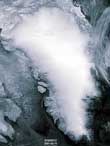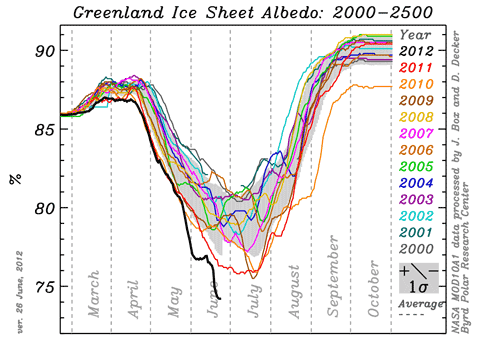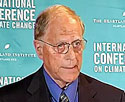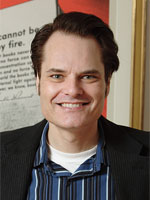 Jason Box reports that the Greenland ice sheet darkening recorded in satellite albedo ((High albedo = very white, lots of reflection; low albedo = darker, more heat absorbed)) measurements is setting new records this summer, especially at high altitudes. Box recently blogged that ice sheet reflectivity this summer “has been the lowest since accurate records began in March, 2000”.
Jason Box reports that the Greenland ice sheet darkening recorded in satellite albedo ((High albedo = very white, lots of reflection; low albedo = darker, more heat absorbed)) measurements is setting new records this summer, especially at high altitudes. Box recently blogged that ice sheet reflectivity this summer “has been the lowest since accurate records began in March, 2000”.
Here’s the latest “noodle plot” ((Looks like a spaghetti graph to me. What is it with climate people and pasta?)) (regularly updated here) for the ice sheet between elevations of 2,000 and 2,500 metres. 2012 (the black line) is well down into new record territory:
Box comments:
What I expect we will see if these low albedo conditions persist is 100% surface melting over the ice sheet. This would be a first in observations. It may not happen this year, but the trajectory the ice sheet is on, along with amplified Arctic warming, will have the ice sheet responding by melting more and more.
To see this darkening in action, have a look at the MODIS image of the west Greenland ice sheet here. You can see the surface melt spreading inland and upwards, grey ice dotted with blue lakes. Add another interesting, if depressing, graph to the panoply of information on the Arctic summer. The sea ice doesn’t look too good either…
In other Greenland-related news, a new study published in Proceedings of the National Academy of Science by Liu et al ((Zhengyu Liu, Anders E. Carlson, Feng He, Esther C. Brady, Bette L. Otto-Bliesner, Bruce P. Briegleb, Mark Wehrenberg, Peter U. Clark, Shu Wu, Jun Cheng, Jiaxu Zhang, David Noone, and Jiang Zhu. Younger Dryas cooling and the Greenland climate response to CO2. Proceedings of the National Academy of Sciences, June 25, 2012 DOI: 10.1073/pnas.1202183109 – PDF here.)), Younger Dryas cooling and the Greenland climate response to CO2 (Science Daily, PNAS abstract), looks at the ice sheet temperature record inferred from the oxygen isotope measurements taken from ice cores, and concludes that they may overestimate the extent of the Younger Dryas cooling. This is interesting stuff for those who have been following the Easterbrook story, because Don places great store by the ice core temperature record. He was wrong before this paper hit the presses, but he’s even wronger now!


 Will Hutton’s Observer
Will Hutton’s Observer  It’s been a long time, as
It’s been a long time, as  There it was in my Google News feed — a headline saying Sorry Global Warming Alarmists, The Earth Is Cooling. As you might expect, it caught my attention, because the Earth is doing no such thing. Following
There it was in my Google News feed — a headline saying Sorry Global Warming Alarmists, The Earth Is Cooling. As you might expect, it caught my attention, because the Earth is doing no such thing. Following  A recent
A recent